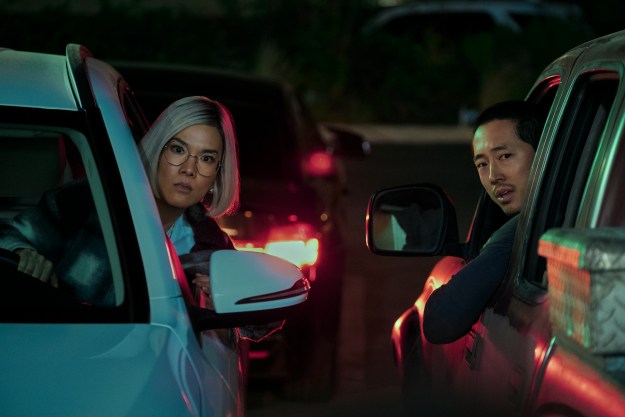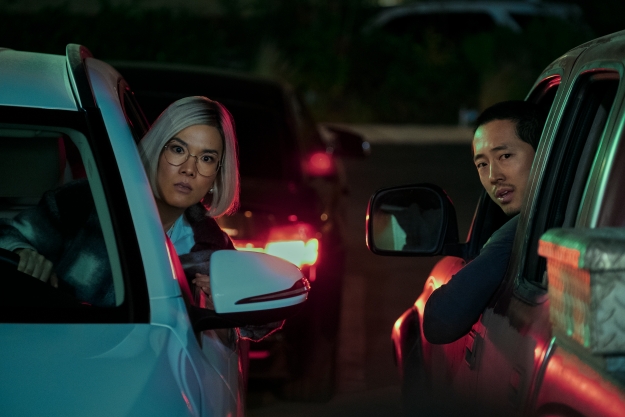
“Netflix’s Beef is a darkly funny, emotionally compelling series that’s unlike anything we’ve seen on TV in recent memory.”
- Steven Yeun and Ali Wong’s career-best performances
- An engaging and aesthetically pleasing visual style
- A winning combination of dark humor and devastating emotional vulnerability
- A handful of one-note supporting characters
Beef is not prescriptive. That’s one of the best things about it. Created by Lee Sung Jin, the Netflix and A24-produced series is a 10-episode dramedy about two people who refuse to get over an inconsequential road rage encounter. Their irrational anger toward each other, as well as the decisions they make in order to get back at one another, lead to increasingly devastating and dark consequences. Despite the many, many awful decisions that its leads make, though, Beef never tells you how you should or shouldn’t feel at any given moment or where your sympathies should lie.
Narratively, tonally, and stylistically, the series exists in a space that isn’t occupied by many other TV shows or movies. At times, the series feels deeply indebted to the work of Joel and Ethan Coen, whose ability to combine pitch-black humor with emotional brutality has been at the center of many of their best films. With its story about a series of seemingly small moral concessions that lead to major consequences, the series even feels narratively akin to Coen Brothers classics like Blood Simple and Fargo.
There is, however, no stand-in for Frances McDormand’s Marge in Beef. The series doesn’t have an avatar of moral righteousness or someone who bears no responsibility for the tragic turns its story takes. There is only a collection of deeply flawed, restless characters, all of whom make decisions throughout Beef’s 10-episode first season that not only threaten to tear their lives apart but also remind us of how the most powerful connections in our lives can manifest in surprising and unexpected ways.

Beef begins simply enough. After finding himself at the brunt end of a rude cashier at a local appliances store, Danny (Steven Yeun) gets in his car and starts to back out of his parking space. Unfortunately, he doesn’t see the white SUV that just so happens to be driving behind him at that exact moment, whose driver, Amy (Ali Wong), lays on her horn the second that Danny’s truck even comes close to backing into her. A moment later, Amy rolls down her window and flips Danny off — prompting him to irrationally chase her out of the parking lot.
The two engage in a dangerous car chase through Amy’s suburban neighborhood. However, while it looks like their relationship may end with Amy driving away victoriously, neither she nor Danny are willing to let their animosity toward each other go so easily. By the time Beef’s masterful first episode, which was penned by Lee and directed by Tokyo Vice director Hikari, has to come to an end, Danny has successfully tracked Amy down and retaliated for her psychotic rudeness on the road. Amy, in response, tracks Danny down and the two begin a feud that slowly but surely grows to encompass all of their closest family members and loved ones, including Amy’s sensitive but emotionally manipulative husband, George (Joseph Lee), and Danny’s younger brother, Paul (Young Mazino).
Across its 10 episodes, Beef touches on contemporary ideas about gender politics, generational trauma, and the bitterness that can exist between members of different economic classes. Amy, a rich, self-made businesswoman, repeatedly uses Danny’s financial instability and low income to try to publicly shame him. While Beef doesn’t shy away from touching on the political and economic aspects of its characters’ lives, though, it never focuses on them so much that they become the point of the show, either. Instead, the series uses them to further flesh out its portrait of life in the 21st century where it has, perhaps, never been easier to use other people as vessels for your own rage and frustration.

The series never, at any point, lets Danny or Amy off the hook for their behavior. It becomes clear early on in Beef that the characters are using their feud to try to exorcise their anger and sadness over the aspects of their own lives that they’d rather not face. Beef’s interest in exploring the reasons behind Amy and Danny’s irrational behavior doesn’t ever extend too far, though. The show even meets Amy’s attempts to blame her emotional shortcomings on her own generational trauma with squinted eyes. In one brilliant, late-season twist, Beef also forces Danny to face the fact that he can’t always blame someone else for the problems in his life.
As their rivalry grows more dangerous, the clearer it becomes that Danny and Amy are, in many ways, soulmates. Through the two characters’ moments of reckless action and mercy, Lee Sung Jin reveals how your emotional compatibility with a person can make you either their greatest friend or their worst enemy. Wong and Yeun, for their part, explore the emotional prickliness of their characters with surprising levels of anger and hopelessness. Beef gives both actors the chance to turn in some of the best performances of their careers. That’s especially true for Yeun, whose Danny experiences a sudden breakdown in one of Beef’s early episodes that requires the actor to be more nakedly vulnerable on-screen than he ever has before. The scene, which rides the line between tragedy and humor well, is made immense by the emotional depths that Yeun mines over the course of one long, unbroken take.
Rounding out the show’s ensemble cast, Young Mazino turns in a breakout performance as Paul that should, hopefully, earn the actor quite a lot of attention in the coming months. Paul, like many of Beef’s characters, uses his outward persona (a crypto bro) to hide underlying insecurity and desperate longing for connection that might have come across as hammy in another performer’s hands. Mazino, however, makes you buy the idea that so many contradictory emotions and impulses can exist within Paul. Elsewhere, David Choe, Ashley Park, and Justin H. Min turn in similarly well-calibrated performances as three of the supporting figures in Amy and Danny’s lives.

Visually, Beef is among the more accomplished shows of the past few years. Lee Sung Jin, Hikari, and Paper Towns director Jake Schreier split the show’s directing duties, with the latter helming six of its first 10 episodes. Together, they’ve delivered a show that not only features consistently stunning, sun-dappled cinematography throughout, but which knows the value of unbroken, not necessarily flashy camera takes. There are multiple instances throughout Beef in which the camera simply rests on Wong and Yeun’s faces as their emotions play out through eyes that always seem to be on the verge of tears. Beef isn’t afraid to force its viewers to sit in the difficult emotions of its story, and its visual style reflects its narrative patience.
Beef’s willingness to explore its characters’ often ugly emotions is made all the more powerful by the fact that it never feels the need to explain itself or verbalize the “point” of its story. The series trusts its audience to know when a character has, as Beef’s often do, made a terrible mistake. Even more importantly, it has faith in the weight of its story, which allows it to arrive at conclusions that frequently feel ambiguous and open-ended, but which contain a visual and emotional power that is rarely seen even in today’s era of prestige TV.
Run, don’t walk to Beef, but make sure to strap yourself in. It’s gonna be a bumpy but worthwhile ride.
Beef season 1 is now available to stream on Netflix.
Editors’ Recommendations
Services Marketplace – Listings, Bookings & Reviews
